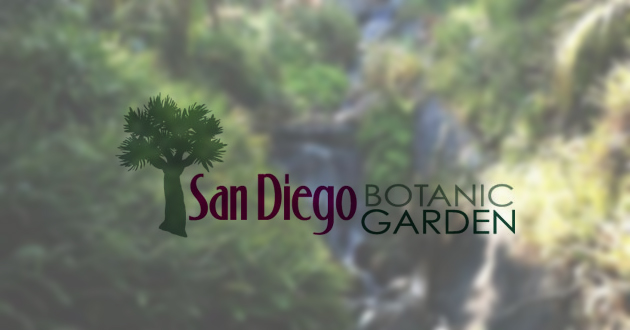The Garden’s conservation horticulture team will lead restoration of the coastal native habitat, making it accessible for local schoolchildren and more resilient to climate change
Encinitas CA— Last month, the California State Coastal Conservancy approved a grant of up to $200,000 to San Diego Botanic Garden (SDBG) to enhance and restore more than half of Ocean Knoll Canyon, an important section of the Cottonwood Creek Watershed in the City of Encinitas. The project’s 4.6 acres are adjacent to Ocean Knoll Elementary School of Encinitas Union School District (EUSD). The canyon is a multi-benefit ecosystem, serving as a refuge for native plants and animals – some of which are endangered – in addition to holding significant potential value for educational opportunities for thousands of children.
“We couldn’t be more thrilled to improve native plant habitat at Ocean Knoll Elementary School’s Canyon,” said Ari Novy, PhD, the Garden’s President and CEO. “The only thing we get more excited about than preserving plant life in our region is educating kids about our amazing flora. This project allows us to do both.”
Under the project, SDBG will remove high water-intake and fire-volatile invasive plant species that have overgrown the canyon, as well as trash and debris. The plants that will be removed currently hamper biodiversity, reduce water availability and quality, and limit the adjacent school’s access to the habitat’s natural outdoor classroom. The Garden will replace these plants with native Diegan coastal sage scrub plants that require less water and increase drainage capacity. Among the plants that SDBG will use to revegetate the canyon are plants that increase carbon sequestration in the soil, naturally reduce the concentrations or toxic effects of environmental pollutants, and are more resilient than current plants to climate change. These plants improve the condition and functionality of the surrounding environment, providing a refuge for native and special status plants and animals, such as the Del Mar Manzanita, a rare native shrub that grows in Southern California, and the coastal California gnatcatcher, a small non-migratory bird. The grant will also fund SDBG’s continued collection of seeds and support development of SDBG’s seed bank, which will conduct research to measure the seeds’ resiliency under various climate conditions. To promote growth of adaptable native species, the Garden intends to reintegrate plants that show the highest resiliency to climate change.
During the first phase of this project, the Garden will also work with local stakeholders to develop the framework for an outdoor educational and curricular program that integrates the project site. It will also place educational signage around the canyon. During a future phase of the project, SDBG will engage the local community to facilitate long-term maintenance and monitoring of the canyon. In the second phase, the Garden will also finalize and launch the eco-environmental education program in cooperation with the neighboring EUSD Farm Lab. EUSD intends to make the Ocean Knoll Canyon site available to all students and teachers in its nine elementary schools to learn about ecosystems, plants and animals. The school district plans to train teachers and invest in materials to create an outdoor ‘living laboratory’ in the canyon and surrounding areas.
Funding for this grant comes from the bipartisan Proposition 1 water bond, also known as The Water Quality, Supply, and Infrastructure Improvement Act of 2014. SDBG will also receive $125,000 in funding from both the Natural Resources Conservation Service and the City of Encinitas toward additional project costs related to the removal and control of invasive species.
With this project, SDBG adds a new location to its portfolio of land restoration projects outside the perimeter of the Garden’s 37-acre Encinitas campus. In partnership with the City of Encinitas, the Garden also carries out plant conservation and native species stewardship further down the Cottonwood Creek Watershed. During the past year, SDBG staff and volunteers have cared for and restored a trail and open areas adjacent to Cottonwood Creek Park and Encinitas Boulevard, near Moonlight Beach. Together, these two projects will promote connectivity and habitat health throughout the 2,250 acres of Cottonwood Creek Watershed.
The City of Encinitas’s Environmental Commission named SDBG a 2020 winner of its prestigious Environmental Award Program (EAP) in recognition for its Excellence in Environmental Stewardship among non-profit organizations, noting that the Garden is “the preeminent plant conservation institute in the region, and one of the most important botanic gardens in the country.”
Established in 1970, San Diego Botanic Garden is an urban oasis that creates, shares and applies plant wisdom with people of all backgrounds, ages and interests. SDBG works in conservation horticulture, botany, and applied plant sciences to address important local and global issues — from food security and climate change to land management and home gardening. The Garden’s botanical research and applied science activities range from plant conservation and ecosystems management to horticultural improvement and pollination studies. SDBG’s Department of Conservation Horticulture focuses on the preservation of rare and endangered plants and the restoration of native habitats to protect local ecosystems for the future. The Garden collaborates with local academics, companies and organizations to create and share innovative, impactful knowledge, initiative, and programs. By expanding its scientific and conservation role to address our most pressing issues and human-plant relationships, SDBG is quickly becoming a model 21st century public plant science institution.
Address: San Diego Botanic Garden – 300 Quail Gardens Drive, Encinitas, CA 92024
Website: https://www.sdbgarden.org/ Facebook: https://www.facebook.com/SDBotanicGarden Instagram: https://www.instagram.com/sandiegobotanicgarden/
For more information, please contact Ashley Grable at agrable@sdbgarden.org / 760-688-8350.



